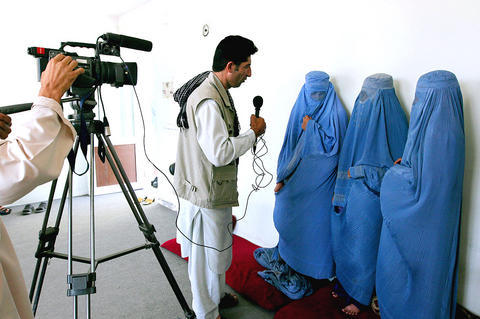Two of the South Korean aid workers held hostage in Afghanistan were to be released within hours, a Taliban commander said yesterday, as new talks began over the three-week crisis.
Commander Abdullah Jal said the two women were still in the hands of the militants, but would be released yesterday as a goodwill gesture from the Islamist hardliners.
"God willing, they will be freed this afternoon as a gesture of good intention from the Taliban leading council," said Jal, the commander for the Ghazni region where 23 South Koreans were abducted on July 19.

PHOTO: AP
Two of the hostages have since been murdered by the Taliban, which has threatened to kill the remaining 21 unless the Afghan government meets their demands to release a similar number of key Taliban prisoners.
A Taliban delegation and a South Korean team meanwhile began a third day of talks at the offices of the Afghan Red Crescent Society in Ghazni, 140km south of Kabul.
"The third round of talks started between the Taliban and South Koreans," Ghazni Province intelligence chief Mohammad Jaseem Khan said.
The talks, which began on Friday, were being held behind closed doors. Journalist were barred from even assembling outside the venue yesterday.
Intelligence agents had warned photographers against taking any pictures in the town, an AFP photographer said.
The talks coincided with fresh hopes that two of the 16 women in the group would be free later in the day.
The Taliban first announced the release on Saturday but hours later the regular spokesman for the group, Yousuf Ahmadi, said the handover appeared to have been delayed by "transport difficulties."
Earlier yesterday, South Korea's Yonhap news agency quoted Ahmadi as saying, "Our leaders have changed their minds and suspended their earlier decision to free two female hostages."
Ahmadi however did not rule out the possibility of a release later.
"The plan to release two female hostages first is still valid, but the timing has not been fixed yet," he said. "There might be confusion and misunderstanding ... I hope the situation will be resolved quickly."
South Korean officials refused to confirm the report, and Ahmadi could not be reached directly for comment.
Direct negotiations between the Taliban and a South Korean team are seen as one of the final options to save the group.
On Saturday the Taliban repeated a demand for the release of jailed militants in exchange for the remaining hostages, a condition the government of Afghan President Hamid Karzai has rejected, saying it could encourage kidnappings.
The hardliners are also involved in the separate abduction last month of two German engineers, one of whom has since been killed.
The Taliban has also demanded a prisoner swap for the surviving German, who is being held with four Afghans.

DAREDEVIL: Honnold said it had always been a dream of his to climb Taipei 101, while a Netflix producer said the skyscraper was ‘a real icon of this country’ US climber Alex Honnold yesterday took on Taiwan’s tallest building, becoming the first person to scale Taipei 101 without a rope, harness or safety net. Hundreds of spectators gathered at the base of the 101-story skyscraper to watch Honnold, 40, embark on his daredevil feat, which was also broadcast live on Netflix. Dressed in a red T-shirt and yellow custom-made climbing shoes, Honnold swiftly moved up the southeast face of the glass and steel building. At one point, he stepped onto a platform midway up to wave down at fans and onlookers who were taking photos. People watching from inside

A Vietnamese migrant worker yesterday won NT$12 million (US$379,627) on a Lunar New Year scratch card in Kaohsiung as part of Taiwan Lottery Co’s (台灣彩券) “NT$12 Million Grand Fortune” (1200萬大吉利) game. The man was the first top-prize winner of the new game launched on Jan. 6 to mark the Lunar New Year. Three Vietnamese migrant workers visited a Taiwan Lottery shop on Xinyue Street in Kaohsiung’s Gangshan District (崗山), a store representative said. The player bought multiple tickets and, after winning nothing, held the final lottery ticket in one hand and rubbed the store’s statue of the Maitreya Buddha’s belly with the other,

‘NATO-PLUS’: ‘Our strategic partners in the Indo-Pacific are facing increasing aggression by the Chinese Communist Party,’ US Representative Rob Wittman said The US House of Representatives on Monday released its version of the Consolidated Appropriations Act, which includes US$1.15 billion to support security cooperation with Taiwan. The omnibus act, covering US$1.2 trillion of spending, allocates US$1 billion for the Taiwan Security Cooperation Initiative, as well as US$150 million for the replacement of defense articles and reimbursement of defense services provided to Taiwan. The fund allocations were based on the US National Defense Authorization Act for fiscal 2026 that was passed by the US Congress last month and authorized up to US$1 billion to the US Defense Security Cooperation Agency in support of the

‘COMMITTED TO DETERRENCE’: Washington would stand by its allies, but it can only help as much as countries help themselves, Raymond Greene said The US is committed to deterrence in the first island chain, but it should not bear the burden alone, as “freedom is not free,” American Institute in Taiwan Director Raymond Greene said in a speech at the Institute for National Defense and Security Research’s “Strengthening Resilience: Defense as the Engine of Development” seminar in Taipei yesterday. In the speech, titled “Investing Together and a Secure and Prosperous Future,” Greene highlighted the contributions of US President Donald Trump’s administration to Taiwan’s defense efforts, including the establishment of supply chains for drones and autonomous systems, offers of security assistance and the expansion of